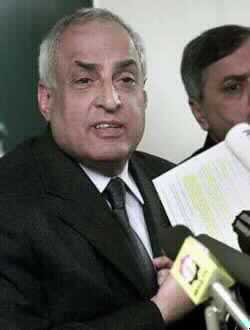Iraq launched a public relations offensive against the United States and Britain, saying it had nothing to hide and that Washington was even welcome to send in CIA agents to direct U.N. arms inspectors to any suspect sites. President Saddam Hussein and his officials said on Sunday Iraq was doing all it could to cooperate with the United Nations and urged the world to halt the American-British war machine. Washington was unmoved.
"While we have not given up on disarming Iraq through the United Nations, we are now entering a final phase in how we compel Saddam Hussein to disarm," said a White House official. He declined comment on the offer to send in CIA agents.
Amir al-Saadi, one of Saddam's top advisers, told a news conference in Baghdad that U.N. inspections over the past four weeks had shown U.S. and British charges that Iraq possessed weapons of mass destruction were "lies and baseless".
Saadi challenged Washington and London over their statements that there were holes in the arms declaration that Iraq presented to the United Nations two weeks ago, and said Baghdad was ready to answer any questions from the Western allies.
"We do not even have any objections if the CIA sent somebody with the inspectors to show them the suspected sites," he said, making clear Iraq stood by its official line that it did not possess any weapons of mass destruction.. Saadi said "rehashed allegations" were based on a previous U.N. inspection mission, accusing it of falsifying evidence to suggest Iraq had carried on developing a deadly nerve agent VX. Saddam himself accused the United States of trying to harass him.
"The world should tell America now there is no need for more aggression and sanctions on Iraq in order to let it cooperate freely (with the U.N.)," he told a group of visitors.
WAR PREPARATIONS
From war games to planning, the United States and Britain have made no secret of preparing for possible war to back up demands that Saddam come clean -- 11 years after the Gulf War.
So far Britain has been Washington's staunchest ally on Iraq. London defence expert Paul Beaver said Saadi's remarks seemed designed to undermine the U.S. and British case and appeal to those countries less convinced of the merits of war.
"This is an Iraqi attempt to counter what is becoming quite a sophisticated campaign in the West...almost to create a war atmosphere," Beaver told the BBC. The United States last week condemned Iraq's arms declaration as incomplete and therefore a "material breach" of a U.N. Security Council resolution adopted in November.
Defying the resolution carries an implicit threat of eventual war. The United States is forging ahead with a build-up that may see over 100,000 troops in the Gulf region in January or February.
The New York Times said U.S. intelligence agents were working with Kurdish groups in northern Iraq opposed to Saddam.
Military experts say a war should be waged before March or April if planners in Washington and London want to avoid the searing desert heat of Iraq's summer. A January 27 briefing by U.N. arms inspectors to the United Nations Security Council is widely seen as the next key date that could trigger a U.S.-led war against Iraq.
Saadi addressed specific questions raised by Washington and London, such as over attempts to obtain uranium and efforts to develop VX, which he said Iraq had given up. He accused the last inspectors, who left four years ago, of tainting Iraqi samples with VX to fabricate evidence against Baghdad.
He said the new U.N. chief weapons inspector Hans Blix had asked Iraq for a list of certain scientists working in key fields and this would be provided by the end of the year.
ISRAEL PREPARES
Israel was taking steps against a possible strike by Iraq, scheduling joint exercises with U.S. forces and gas mask lessons for children, Israeli officials said on Sunday.
Israel fears Saddam will respond to any attack by firing missiles at it, armed with chemical or biological warheads.
Israeli media said the nation would go on high alert from January 15 in anticipation of hostilities starting in the month after January 27. The Defence Ministry would not confirm that.
Some 1,000 U.S. troops are expected in Israel this week for an exercise involving U.S.-made Patriot missiles, which were largely ineffective in intercepting 39 Scud missiles that Iraq fired at Israel in the 1991 Gulf War.
The Patriot has since been upgraded and Israel has developed and deployed the more effective Arrow anti-missile system.
U.N. inspectors in Iraq pursued their hunt for banned arms on Sunday. Iraqi officials said sites searched by the inspectors included a space research centre in Baghdad.
Scores of U.N. arms inspectors are scouring Iraq for evidence of nuclear, chemical or biological weapons, but Washington has made clear it believes it has enough evidence of its own to justify military action if Iraq does not own up.
PHOTO CAPTION
General Amir al-Saadi, adviser to President Saddam Hussein), speaks during a press conference in Baghdad December 22,2002. Iraq said on Sunday it was ready to answer any questions raised by the United States and Britain on its arms declaration, and would allow the CIA to come and identify suspect sites for weapons inspectors. Photo by Akram Salah/Reuters
- Dec 22 2:14 PM ET
- Author:
& News Agencies - Section:
WORLD HEADLINES


 Home
Home Discover Islam
Discover Islam Quran Recitations
Quran Recitations Lectures
Lectures
 Fatwa
Fatwa Articles
Articles Fiqh
Fiqh E-Books
E-Books Boys & Girls
Boys & Girls  Hajj Rulings
Hajj Rulings Hajj Fatwas
Hajj Fatwas














